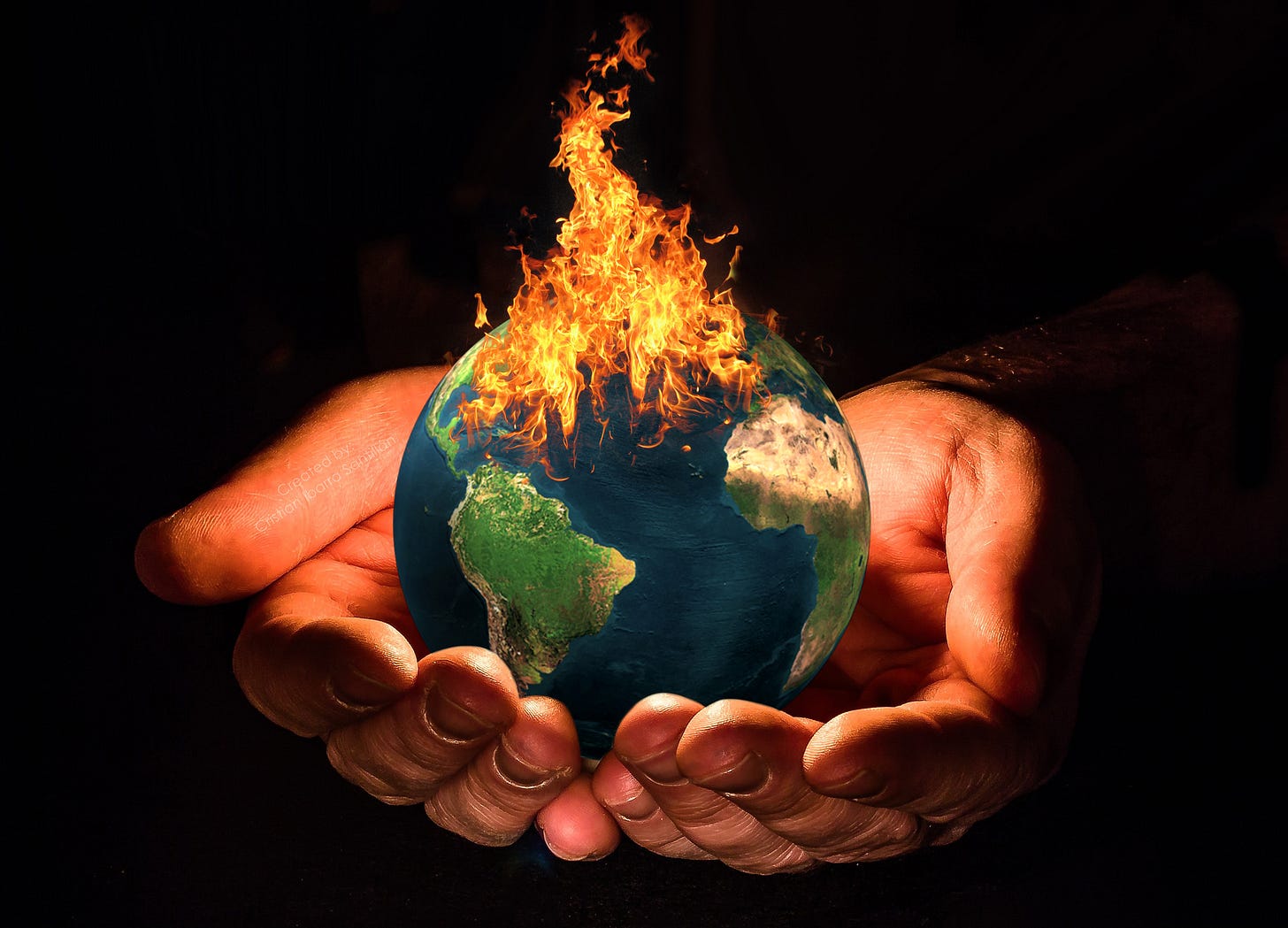Catastrophe, Extinction, and the Limits of Collective Human Imagination
"Under the best of circumstances, we will see global catastrophe with highly-populated regions becoming uninhabitable."
by Joel Martin
There is no point in sugar coating this. We almost certainly passed the 1.5 degree Celsius global temperature increase target last year and 2024 is looking to be even hotter. According to insideclimatenews.org, “the world is on a path to heat by about 2.7 degrees Celsius by 2100, which would threaten modern human civilization within the lifespan of children born today” (emphasis added). A temperature increase of 2.7 degrees Celsius corresponds to a staggering increase of nearly 5 degrees Fahrenheit — on average — which means heatwaves will be much hotter.
Under the best of circumstances, we will see global catastrophe with highly-populated regions becoming uninhabitable. Billions of people may have to migrate to other geographies just to survive and no wall will stop migration at this scale. We will lose an untold number of species to extinction — birds are already disappearing at an astounding rate. Other species, particularly mosquitos (the world’s most deadly animal), are expanding their ranges.
The question is, how far do we let this go? How bad do we let it get? We continue to treat this calamity like it is an abstraction or a fictional curiosity out of a Sci-Fi movie. It seems that we humans have the intellectual ability to predict the arrival of this very real nightmare but that we lack the imagination to place ourselves or our descendants in the midst of it.
According to the polls, a majority of Americans are worried about climate change but vanishingly few are willing to do anything about it, especially if it means changing their lifestyle. I live in a well-educated, generally liberal Democratic neighborhood. I imagine that greater than 90% of my neighbors believe that climate change is real and a huge threat to the planet. However, other than a smattering of electric cars, I don’t see any changes in their behavior whatsoever.
I get that we have a huge number of things to worry about. I’m dismayed by our slide toward autocracy, the erosion of women’s right to choose, the savagery perpetrated by all the people across the globe who hate one another … The list is endless and it makes me very sad. It all matters so much but does it really matter at all if no one has anywhere to live?
There are politicians who understand the problem who can’t do anything about it because any real action is politically untenable. Can you imagine what would happen if President Biden declared a climate emergency, raised gas and jet fuel prices by 100%, and dramatically raised fuel efficiency standards on trucks and SUVs? Whose fault is it that the US Government isn’t doing enough? As the famous cartoonist Walt Kelly put it on the first Earth Day in 1970, “We have met the enemy and he is us.”
Nothing is going to change until we have millions of people marching in the streets demanding change. That will happen eventually, even in red states. Florida will be under water soon enough but, before then, it will be battered by ever more powerful hurricanes (scientists are now calling for a new category 6). Climate change will force human change. The question is when?
It may not seem like you can do much, but a mass movement starts with passionate individuals. We need to make it socially unacceptable to be a climate criminal. It worked for smoking, and it can work here too. You can make a difference by consuming less: less gas, less travel, less fast fashion, less everything. I’d bet good money that you won’t miss it. Set an example. Get politically active. Talk to family members. … and please get out the vote this November!
Joel Martin is a climate activist and writer for San diego350.org and The Jumping-Off Place. He is a scientist, semi-retired biotech entrepreneur, and long-time San Diego resident.



